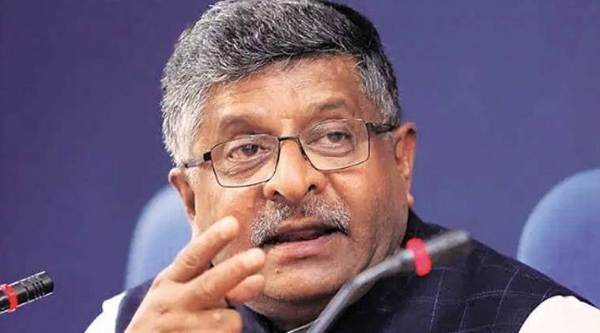Need to acknowledge sovereignty of data: Prasad
The minister’s remarks come in the backdrop of the Centre banning 59 apps with Chinese links, citing “emergent nature of threats” and saying that they were engaged in activities “prejudicial to sovereignty and integrity”, defence, security and public order.
 Prasad also emphasised the need for a resilient global supply chain and making India an attractive destination for investment in those chains.
Prasad also emphasised the need for a resilient global supply chain and making India an attractive destination for investment in those chains.
IT Minister Ravi Shankar Prasad on Wednesday reiterated the importance of “data sovereignty” at the G20 Digital Economy Ministers virtual meeting, where he spoke in the presence of the Chinese IT minister.
“The digital platforms need to be responsive, accountable and sensitive to the concerns of sovereign nations as far as safety, defence and data privacy are concerned,” Prasad said in the meeting. “We understand the issue of data innovation and data cross flow but we also need to acknowledge the sovereignty of the data… we are very clear that data must belong to the sovereign nation concerned to protect the privacy of its people, to protect the digital concerns of its people. And obviously, giving good occasions for innovation… all has to have a proper balancing act.”
The minister’s remarks come in the backdrop of the Centre banning 59 apps with Chinese links, citing “emergent nature of threats” and saying that they were engaged in activities “prejudicial to sovereignty and integrity”, defence, security and public order.
A press statement said that Prasad “mentioned that India is soon going to put in place a robust personal data protection law which will not only address the data privacy related concerns of citizens but also ensure availability of data for innovation and economic development. In view of these concerns, the digital platforms having presence in many countries must become trustworthy, safe and secure.”
Data protection laws and calls to restrict flow of data between national borders has been an unresolved debate among global leaders. In 2019, G20 leaders had drawn up the “Osaka track” that promoted cross-border flow of data. India did not sign the declaration, while Australia, China, Japan and the UK were among 24 countries that did.
A ministerial declaration from Wednesday’s meeting hosted by Saudi Arabia stated: “The cross-border flow of data, information, ideas and knowledge generates higher productivity, greater innovation, and improved sustainable development. At the same time, we recognise that the free flow of data raises certain challenges, such as the protection of privacy and personal data. G20 members recognise the need to address these challenges, in accordance with relevant applicable legal frameworks, which can further facilitate data free flow and strengthen consumer and business trust, without prejudice to legitimate public policy objectives.”
The declaration included a G20 Roadmap towards “Common Framework for Measuring the Digital Economy” in order to define and measure the digital economy. The indicators are related to infrastructure, technology adoption and innovations, empowering society, and jobs, skills and growth. The declaration also called for a “human-centered approach to AI”.
Prasad also emphasised the need for a resilient global supply chain and making India an attractive destination for investment in those chains.







